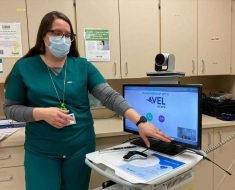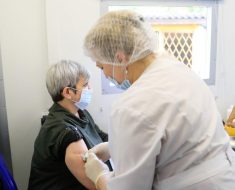Dementia risk soars for middle aged people who are under weight, lose a spouse, or struggle to sleep at night
- Study by Boston University School of Medicine looked at risk factors that can be found on free databases by any doctor
- They found mid-life factors like losing a spouse and low weight drive up the risk
Dementia is a disease that mainly plagues the elderly, but new research reveals mid-life struggles drive up our risk.
People who are widowed, struggle to sleep, and have low weight in their 50s and 60s have a much higher risk of developing the disease down the line.
The study by Boston University School of Medicine sheds new light on which factors affect our risk, and how they interact with one another.
The researchers say it brings us closer than ever to understanding ways to prevent the disease.

People who are widowed, struggle to sleep, and have low weight in their 50s and 60s have a much higher risk of developing the disease down the line, Boston University found
‘This study is the first step in applying machine learning approaches to identifying new combinations of factors that are linked to increased risk of dementia later in life,’ said corresponding author Dr Rhoda Au, a professor of anatomy and neurobiology at the university.
‘By focusing on modifiable risk factors, we are hoping to identify disease risk factors that are amenable to change, enabling the possibility of preventing dementia.’
Researchers at Boston University School of Medicine (BUSM) analyzed data from the Framingham Heart Study (FHS) to identify new combinations of risk factors that are linked to increased risk of dementia in later life.
Dr Au’s team used data from the Framingham Heart Study (FHS) to identify new combinations of risk factors that are linked to increased risk of dementia in later life.
Specifically, they looked at demographic and lifestyle data collected from 1979 until 1983 and then determined who was subsequently diagnosed with dementia.
As all research shows, age was the biggest factor associated with dementia: the older the person, the more likely they were to have developed the disease.
However, there were some new findings.
Those who were ‘widowed’ early, had a lower BMI, and experienced less sleep in middle age had a much higher risk than their peers who were married, normal weight, and well-slept in their 50s and 60s.
Dementia is the leading cause of dependence and disability in the elderly population worldwide.
There is no effective medication for dementia treatment.
As such, the team says, identifying lifestyle risk factors which could be modified is key for reducing risk of dementia.
Crucially, they said, they deliberately used information that is readily available to all doctors in the US.
Analyzing this data does not demand expensive testing or training, meaning any primary care physician can check their patients’ specific lifestyle risks.
‘We wanted to identify information that any physician or even non-physician has easy access to in determining potential increased future risk for dementia,’ Dr Au said.
‘Most dementia screening tools require specialized training or testing, but the front line for screening are primary care physicians or family members.
‘This was also an initial attempt to apply machine learning methods to identify risk factors.’
The researchers believe there are potential downstream implications for this study.
‘Demographic and lifestyle factors that are non-invasive and inexpensive to implement can be assessed in midlife and used to potentially modify the risk of dementia in late adulthood.’
These findings appear in the Journal of Alzheimer’s Disease.
Source: Read Full Article





